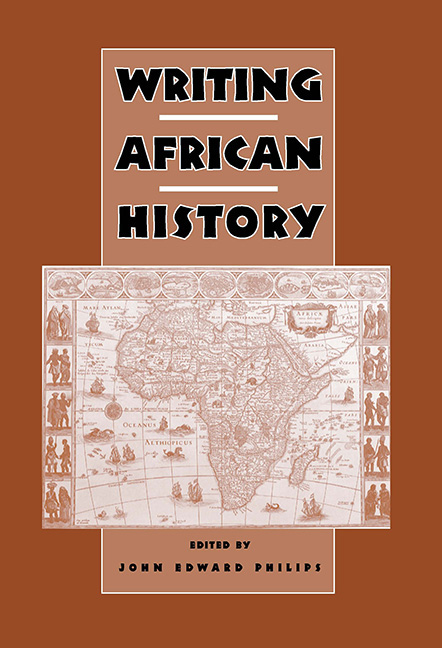Book contents
- Frontmatter
- Dedication
- Contents
- Acknowledgments
- Introduction
- Part I Background
- Part II Sources of Data
- 2 Archaeology and the Reconstruction of the African Past
- 3 Writing African History from Linguistic Evidence 86
- 4 Physical Anthropology and African History
- 5 The Importance of Botanical Data to Historical Research on Africa
- 6 Oral Tradition as a Means of Reconstructing the Past
- 7 Oral Sources and the Challenge of African History
- 8 Arabic Sources for African History
- 9 European Documents and African History
- 10 Mission and Colonial Documents
- Part III Perspectives on History
- Part IV Conclusion
- Contributors
- Index
- Miscellaneous Endmatter
8 - Arabic Sources for African History
from Part II - Sources of Data
Published online by Cambridge University Press: 11 May 2017
- Frontmatter
- Dedication
- Contents
- Acknowledgments
- Introduction
- Part I Background
- Part II Sources of Data
- 2 Archaeology and the Reconstruction of the African Past
- 3 Writing African History from Linguistic Evidence 86
- 4 Physical Anthropology and African History
- 5 The Importance of Botanical Data to Historical Research on Africa
- 6 Oral Tradition as a Means of Reconstructing the Past
- 7 Oral Sources and the Challenge of African History
- 8 Arabic Sources for African History
- 9 European Documents and African History
- 10 Mission and Colonial Documents
- Part III Perspectives on History
- Part IV Conclusion
- Contributors
- Index
- Miscellaneous Endmatter
Summary
This contribution aims to review the known Arabic sources for African history, both published and unpublished, and at the same time to review some of the problems in interpreting them. Although the title of this paper uses the phrase “Arabic sources,” I will also be referring to sources in African languages written in the Arabic script, notably Hausa and Swahili. While using the term “African history,” I shall effectively confine my attention to Saharan and sub-Saharan Africa, with occasional references to North, or Mediterranean, Africa, in so far as the Arabic sources for this segment of the continent illuminate the history of other parts of it.
Arab knowledge of Africa dates from the earliest days of Islam; indeed, the Arabs of the Ḥijāz and the Yemen evidently had some knowledge, at least of “Ethiopia” (al-Ḥabasha, however that may be defined), before the rise of Islam. The first hijra of persecuted Muslims of Mecca was to Ethiopia in 615 c.e., and the Ethiopians retained a respected status in the eyes of Arabic writers, who exalted their “virtues” (faḍā’il, maḥāsin). Ethiopia's proximity to Arabia, and its relative proximity to Egypt (and Coptic Christian links to Ethiopian Christianity), helped to sustain Arab interest in the area, and several Arab writers produced works on that land. Nubia was also one of the earliest lands of Black Africa to become known to the Arabs, who concluded a bilateral agreement (baqṭ) with the Nubian king at Old Dongola in 645. The Arabic texts referring to Nubia, and in some cases to other areas of what is now the Sudan, written between the ninth and the early sixteenth century, have been conveniently gathered together in a single volume edited by Muṣṭafā Muḥammad Sacd.
There are several works that assemble Arabic texts dealing with Africa, or parts of it. The largest, both physically and in regard to coverage, is the magnificent Monumenta Cartographica Africae et Aegypti, edited by Prince Youssouf Kamal of Egypt, and originally privately published by him. As its name indicates, its primary purpose is to present a collection of maps of Africa, but it also includes all known descriptions of Egypt and Africa in their original languages with translations into French or English.
- Type
- Chapter
- Information
- Writing African History , pp. 216 - 253Publisher: Boydell & BrewerPrint publication year: 2005



